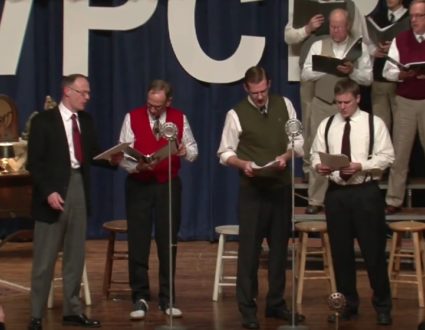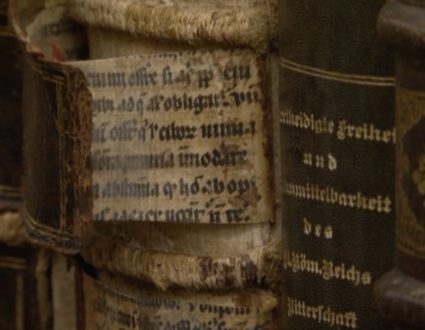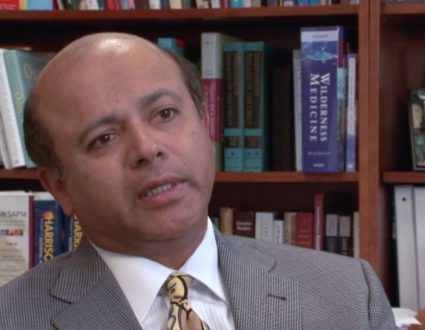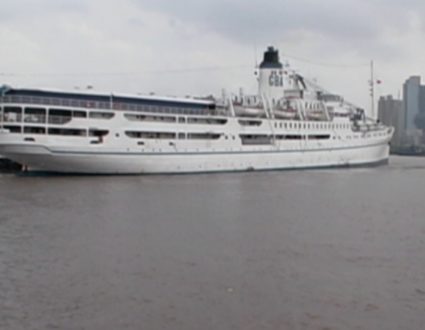RAY SUAREZ: Finally tonight, the true tale of a Christmas Eve attack and rescue during World War II, retold by a Minnesota congregation. Special correspondent Fred de Sam Lazaro has our story.
FRED DE SAM LAZARO: At the annual holiday dinner at Westminster Presbyterian Church in Minneapolis, people are encouraged to share personal Christmas stories. This year, Pastor Tim Hart-Andersen delivered an epic.
REV. TIM HART-ANDERSEN, Westminster Presbyterian Church: So you are a radio studio audience tonight for WPCB, Westminster Presbyterian Church Broadcast Company.
(LAUGHTER)
FRED DE SAM LAZARO: Dozens of volunteers came together to build a set simulating a 1940s-style radio drama, arranged by “Prairie Home Companion” veteran and church member Vern Sutton. It’s based on a true story the pastor heard from his father when he was growing up.
MAN: The night before Christmas, 1944.
FRED DE SAM LAZARO: On Dec. 24, 1944, as the decisive Battle of the Bulge raged, some 2,200 American G.I.s boarded the ship Leopoldville in England headed for the battle’s Belgian frontier.
MAN: It just don’t feel like Christmas Eve.
FRED DE SAM LAZARO: Hart-Andersen’s father, Hank Andersen, was crammed in the ship’s hold.
REV. HENRY “HANK” ANDERSEN, Leopoldville survivor: It was just a miserable situation. So I said, let’s go up on deck and sing Christmas carols. I would say there were 15 to 20 of us were there.
And we were singing Christmas carols. And I was leading them. And all of a sudden, this is becoming a rather tender story. And we can see the lights of Cherbourg in the distance.
FRED DE SAM LAZARO: The drama used sound effects to convey the disaster that was about to strike as the ship was just off the French coast. Some 800 lives were lost in the deadliest incident of the war for the U.S. Army.
WOMAN: Emergency stations. Emergency stations. All hands to emergency stations. The Leopold’s been hit.
WOMAN: The U-boat torpedo hits the Leopoldville below the waterline on the starboard side. Scores of those lovely Yankee boys are killed instantly by the explosion. Others drown as water rushes into the ship. Most of the survivors stand on the deck and watch as other ships come alongside to begin rescue operations.
MAN: Hey, Sarge, Sarge, Sarge, what do we do? That British destroyer, it’s pulled up alongside us. Shall we make a jump for it?
REV. HENRY “HANK” ANDERSEN: These guys were paralyzed. They just would not jump. And — and they had seen some jump and not made it. So, it was quite a jump across.
And I remember getting over there and sliding across what little deck there was, slammed into the bulwark that was there, staggered back up to the rail. And the sight that I had made it enabled them then to start jumping.
MAN: Gee, Rosenblum, are you going to jump?
MAN: Is there another choice?
FRED DE SAM LAZARO: The character Rosenblum was written into the drama when Gail Rosenblum, a local columnist, came across Andersen’s story. Her late father, Sidney, was on the ship, and she’s convinced he was in the singing group. And that, she’d like to think, influenced her love of this music.
GAIL ROSENBLUM, Minneapolis Star Tribune: My friends joke. They tease me because I’m a Jewish girl who loves Christmas carols. I always loved them as a girl.
And so, when I heard the story of Hank and put that all together, I felt like now I understand why I love them. They saved my father’s life, because all the men who came up on deck to sing, thanks to Hank leading them up there, they survived. And all the men who didn’t come up were the victims of that, you know, that torpedo.
REV. TIM HART-ANDERSEN: Her father had this love of music before he went into the service. My father did. And the more we talked, the more we began to sense a kind of narrative that really wound together in some pretty remarkable ways.
MAN: Hey, Archer, can’t a Jew enjoy the lights and sing a few tunes?
MAN: You sing Christmas music?
MAN: So, who do you think does the best Christmas music? Ever wonder about that? Irving Berlin? Mel Torme? Johnny Marks? All Jews. “Winter Wonderland,” “White Christmas” all invented by my people. Who else would name a red-nosed reindeer Rudolph?
(LAUGHTER)
FRED DE SAM LAZARO: His family says Sid Rosenblum talked very little about his war experience. He went on to become a psychologist. Sid Rosenblum died in 1988 at 63.
Hank Andersen was headed to a law career before the war, but became a minister instead. He was an active civil rights campaigner in the ’60s, influenced during the war by an all-black unit in the then-segregated Army which fed and comforted the ship’s survivors when they reached land.
REV. HENRY “HANK” ANDERSEN: They surrounded us and sang Christmas carols. And I — I was so stunned.
FRED DE SAM LAZARO: At 87, Hank Andersen lives in retirement with Mary Andersen, his wife of 64 years.
MAN: The Yanks who survived found a whole new meaning to that Christmas day.
FRED DE SAM LAZARO: Tim Hart-Andersen says he’s glad his father is still alive to see an important story preserved by and for the next generation, one that, in some ways, has morphed into a sermon.
REV. TIM HART-ANDERSEN: I would hope that the kind of universal theme here is that hope cannot be cut off and light cannot be turned off. The human spirit can sing its way through anything.
RAY SUAREZ: Fred’s reporting is a partnership with the Under-Told Stories Project at Saint Mary’s University of Minnesota.
Christmas Carols Saved Lives in World War II
The true tale of a Christmas Eve attack and rescue during World War II, retold by a Minnesota congregation.

“I would hope that the kind of universal theme here is that hope cannot be cut off and light cannot be turned off. The human spirit can sing its way through anything.”

Some 800 lives were lost in the deadliest incident of the war for the U.S. Army.
The drama used sound effects to convey the disaster that was about to strike as the ship was just off the French coast.




















